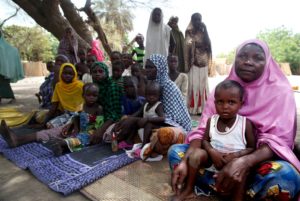Africa’s new famine crisis
A worsening but largely forgotten humanitarian crisis is unfolding in West Africa’s Lake Chad region as almost 10 million people are in need of life saving assistance.
The UN’s top relief official Stephen O’Brien says the crisis is “the new terrible”.
Of the region’s population of about 20 million, 9.2 million are now in in danger of starvation and severe acute malnutrition rates for children under five have surpassed the emergency threshold in the affected areas of four separate countries: Cameroon, Chad, Niger, and Nigeria.
 “This region, which hosts Africa’s fastest-growing displacement crisis, needs our urgent, united and collective attention,” Mr O’Brien told the UN Security Council last month.
“This region, which hosts Africa’s fastest-growing displacement crisis, needs our urgent, united and collective attention,” Mr O’Brien told the UN Security Council last month.
Among those affected are 2.8 million people forced from their homes by the Nigerian jihadist group Boko Haram and also the local host communities that are sheltering the bulk of the displaced – themselves among the world’s poorest and most vulnerable people.
“For months I have been shouting into what feels like an empty room to highlight the dire situation in the Lake Chad Basin,” said Mr O’Brien, who is the UN’s under-secretary-general for humanitarian affairs.
“We urgently need to strengthen international attention onto this neglected crisis,” he said.
In 2014, Boko Haram controlled an area of land in Nigeria’s northeast where it proclaimed a caliphate.
It also raided into neighbouring countries – killing and kidnapping – insisting its interpretation of Islam was the only legitimate faith.
Joint military operations with Chad, Niger, and Cameroon have pushed the group out of most of the areas it once held, but pockets of violence continue in small towns and villages across the Lake Chad region.
The violence means that hundreds of thousands of farmers have missed successive harvests, leaving them further impoverished. In Nigeria, an estimated 244,000 children are currently suffering from malnutrition in areas that used to be no-go zones due to security restrictions.
The Lake Chad Basin area is a fragile environment and communities in the region were already vulnerable due to chronic drought, growing desertification and government neglect before the Boko Haram insurgency.
“Neither the authorities nor communities across the Lake Chad Basin can keep up with the tide of human suffering,” a recent UN report said.
Nigeria’s northeastern city of Maiduguri and its one million inhabitants now host up to 1.6 million displaced people. Across the border in Diffa, Niger – one of the poorest places on earth – there is one refugee for every four residents.
The situation is shaping as the one of the biggest humanitarian crisis seen in this part of Africa.
Any delay in funding aid operations will not only contribute to a deepening of the crisis but will require larger aid interventions to rescue even more people later in the year, aid agencies say.
At the beginning of 2016, the UN issued the humanitarian response plans for each of the four Lake Chad Basin countries. But Niger’s plan is currently only 31 per cent funded, Nigeria has attracted just 29 per cent of required financing, Cameroon 24 per cent, and Chad 18 per cent.
In May, the UN re-costed the response at $US535 million, targeting just 5.2 million of the 9.2 million people in need.
The UN system has also launched a new 90-day plan highlighting the priority humanitarian needs in Nigeria, Niger, Cameroon, and Chad.
It’s costed at $US221 million and prioritises the urgent needs – up until September – in all the different sectors: food security, nutrition, health, water and sanitation, protection, shelter, and education.
Laurie Nowell
AMES Australia Senior Journalist












